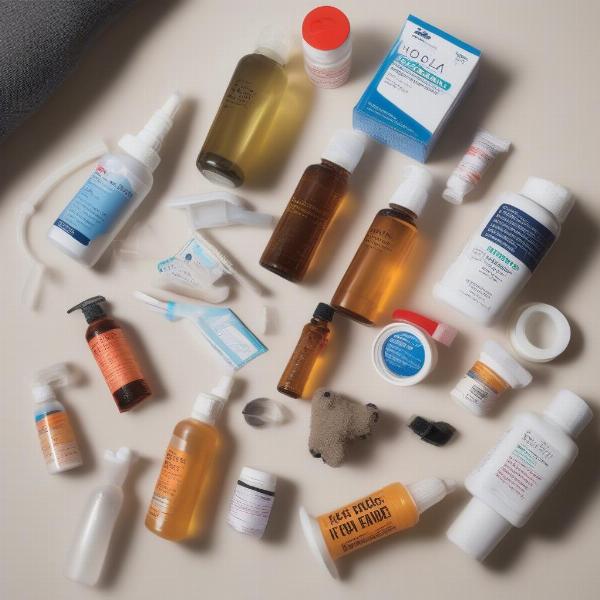Fleas are a common nuisance for dogs, causing itching, skin irritation, and even transmitting diseases. Finding an effective flea treatment for dogs is crucial for their comfort and well-being. This article explores various flea treatment options, from traditional chemical treatments to natural remedies, helping you choose the best solution for your furry friend.
Understanding Flea Infestations
Before delving into treatment options, it’s important to understand the flea life cycle. Fleas thrive in warm environments and can quickly infest your dog and home. Adult fleas lay eggs on your dog, which then fall off into the environment, developing into larvae and pupae before maturing into adult fleas, ready to infest again. This cycle can repeat rapidly, making it crucial to address all stages of the flea life cycle for effective treatment.
Chemical Flea Treatments for Dogs
Several chemical flea treatments are available, including topical solutions, oral medications, and flea collars. Topical treatments are applied directly to the dog’s skin, typically on the back of the neck. Oral medications are ingested and work systemically to kill fleas. Flea collars release insecticide over time, providing ongoing protection. While generally effective, it’s essential to choose a product specifically designed for dogs and follow the instructions carefully to avoid potential side effects.
Choosing the Right Chemical Flea Treatment
 Different Types of Flea Treatments for Dogs
Different Types of Flea Treatments for Dogs
When selecting a chemical flea treatment, consider your dog’s age, breed, and health. Some treatments may not be suitable for puppies, pregnant or lactating dogs, or dogs with certain medical conditions. Consult your veterinarian for personalized recommendations based on your dog’s specific needs. They can help you weigh the benefits and risks of different options and choose the safest and most effective solution.
Natural Flea Treatment for Dogs
For pet owners seeking natural alternatives, several options exist. natural flea treatment for dogs often involve using essential oils, diatomaceous earth, or apple cider vinegar. While these remedies may be less harsh than chemical treatments, their effectiveness can vary, and it’s crucial to use them with caution. Some essential oils can be toxic to dogs, so consult a holistic veterinarian before using them.
Essential Oils for Flea Control
Certain essential oils, such as lavender, cedarwood, and peppermint, are believed to repel fleas. Diluted solutions can be applied to your dog’s coat or used in diffusers. However, never apply undiluted essential oils directly to your dog’s skin, as they can cause irritation. Always ensure proper dilution and consult a veterinarian before using essential oils, especially if your dog has sensitive skin or any underlying health conditions.
Preventing Flea Infestations
Prevention is key to managing flea infestations. Regular grooming, including bathing and combing your dog with a flea comb, can help remove fleas and their eggs. Washing your dog’s bedding and vacuuming your home regularly can also help minimize flea populations. Maintaining a clean environment and practicing consistent grooming habits are essential for keeping your dog flea-free.
Conclusion
Effective flea treatment for dogs requires a multifaceted approach, addressing both existing infestations and preventing future ones. Whether you opt for chemical treatments, natural remedies, or a combination of both, it’s crucial to choose a safe and effective solution tailored to your dog’s individual needs. Regular grooming and environmental control are essential components of any flea treatment plan. By taking proactive steps and working with your veterinarian, you can keep your furry companion happy, healthy, and flea-free.
FAQ
- What is the most effective flea treatment for dogs? The most effective flea treatment depends on your dog’s individual needs and the severity of the infestation. Consult your veterinarian for personalized recommendations.
- How often should I treat my dog for fleas? The frequency of flea treatment depends on the specific product and your dog’s individual circumstances. Follow your veterinarian’s instructions and the product label guidelines.
- Can fleas transmit diseases to dogs? Yes, fleas can transmit diseases such as tapeworms and Bartonellosis (cat scratch disease).
- Are natural flea treatments as effective as chemical treatments? The effectiveness of natural flea treatments can vary. While some pet owners find them effective, they may not be as potent as chemical options.
- How can I prevent fleas in my home? Regular vacuuming, washing pet bedding, and using flea control products in the environment can help prevent flea infestations.
- What should I do if my dog has an allergic reaction to a flea treatment? Contact your veterinarian immediately if your dog experiences any adverse reactions to a flea treatment.
- Can I use cat flea treatment on my dog? No, never use cat flea treatment on a dog. Some ingredients in cat flea products can be toxic to dogs.
most effective flea treatment for dogs
organic flea treatment for dogs
non toxic flea treatment for dogs
ILM Dog is a leading international dog website dedicated to providing expert advice on dog care and well-being. From breed selection and health to training, nutrition, and grooming, ILM Dog offers a comprehensive resource for dog owners worldwide. We are committed to helping you provide the best possible care for your canine companion. For any questions or inquiries, please contact us at [email protected] or +44 20-3965-8624. Visit ILM Dog for more valuable information and resources.